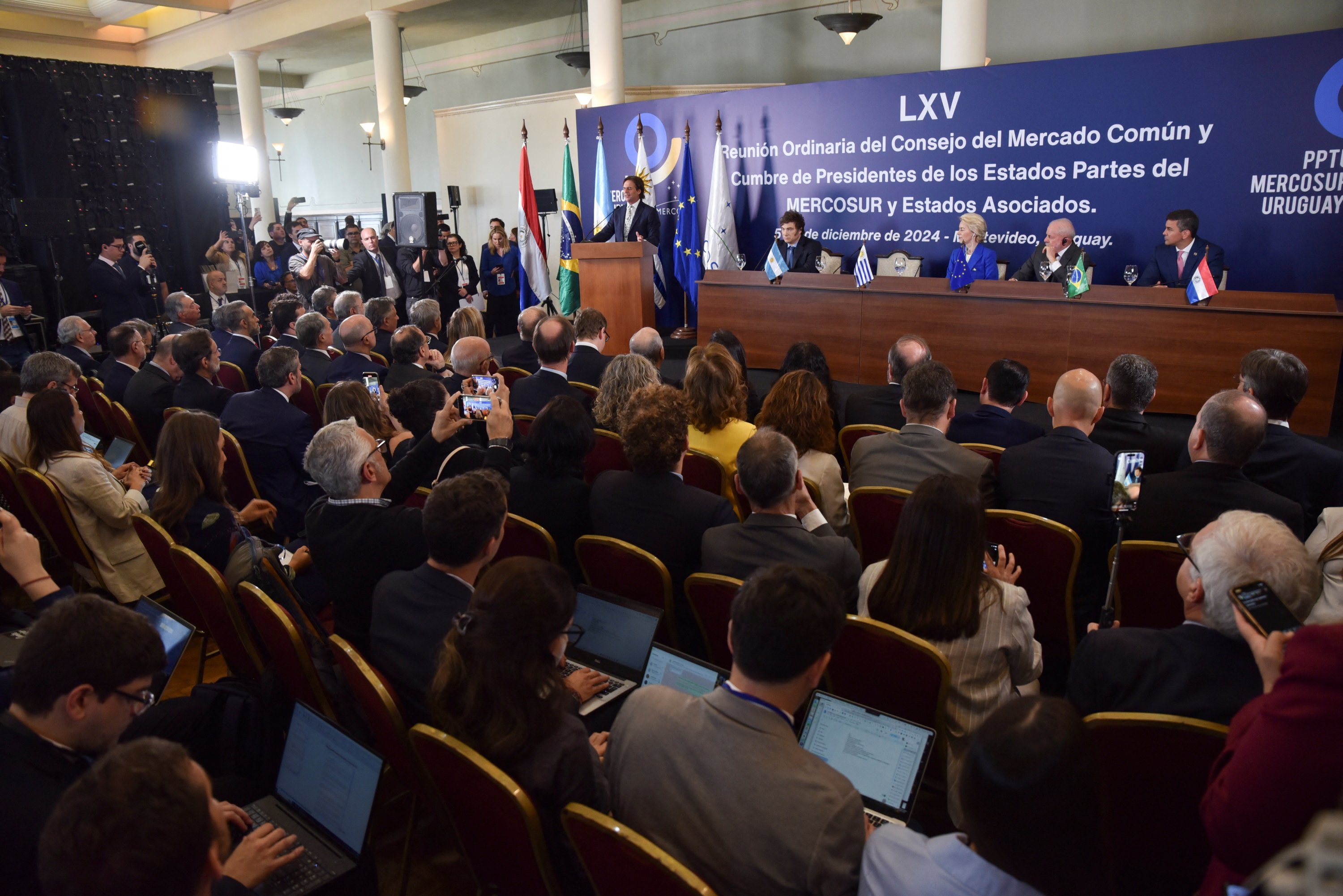© Turkuvaz Haberleşme ve Yayıncılık 2026
The European Union and South America's Mercosur trade bloc on Friday agreed to terms for a long-anticipated free trade deal, which now, however, faces a tortuous battle for approval in Europe, where there is stiff opposition from France.
After negotiations spanning over 20 years, and five years on from an initial deal, European Commission President Ursula von der Leyen and her Mercosur counterparts announced an agreement had been reached in the Uruguayan capital Montevideo.
The deal aims to create one of the largest free trade zones in the world, covering over 700 million people and nearly 25% of global gross domestic product (GDP).
Much like the U.S.-Mexico-Canada free trade agreement, its goal is to reduce tariffs and trade barriers, making it easier for businesses on both sides to export goods.
Mercosur comprises Brazil – the lion’s share of the bloc’s territory, economic output and population – along with Argentina, Paraguay, Uruguay and Bolivia, the newest member. Venezuela's membership has been suspended indefinitely.
"This is a win-win agreement," von der Leyen said in a press conference in Montevideo alongside the presidents of the Mercosur nations.
"This agreement is not just an economic opportunity, it is a political necessity," she added. "I know that strong winds are coming in the opposite direction, toward isolation and fragmentation, but this agreement is our near response."
The deal is not the end of the story for the Europeans. France leads a group of member countries who still have objections to the pact, and all 27 member countries must endorse it for the agreement to enter force.
In remarks aimed at her "fellow Europeans," and perhaps those more skeptical like farmers in France and elsewhere, von der Leyen said it would have a positive impact on around 60,000 companies that export to the Mercosur region.
She said they will "benefit from reduced tariffs, simpler customs procedures and preferential access to some critical raw materials. This will create huge business opportunities."
"And to our farmers,” she said, "we have heard you listen to your concerns, and we are acting on them. This agreement includes robust safeguards to protect your livelihoods."

Reaching a deal has been a protracted process, dating back to a summit in Rio de Janeiro in 1999. Negotiations quickly stalled due to different economic priorities, tariffs, regulatory standards and agricultural policies on both sides of the Atlantic Ocean.
For about a decade, the EU sought to protect its agricultural sector while Mercosur aimed to increase access to its agricultural products.
Some momentum came after 2010, when both sides focused on eliminating tariffs, though issues for agriculture remained. The peak of that movement was a political agreement in June 2019, when negotiators announced a deal that included provisions for tariff reductions and commitments to environmental standards.
Since then, the two sides have struggled to ratify a deal. European concerns over deforestation in the Amazon, particularly during the Jair Bolsonaro presidency in Brazil until the end of 2022, held up an agreement.
Left-wing President Luiz Inacio Lula da Silva, Bolsonaro's successor, initially opposed an agreement more than two decades ago. But since returning to power in 2023, his administration has pushed for progress.
"After more than two decades, we have concluded negotiations on the agreement," Lula wrote on social media platform X.
The outgoing government of Argentina, the bloc's second-biggest economy, opposed the agreement, but President Javier Milei, who took office last year, has supported a deal.
France, the most vociferous critic of the deal, has branded it as "unacceptable." Underscoring the obstacles it now faces, French Trade Minister Sophie Primas pledged to resist its next stages, citing environmental and farming concerns.
European farmers have repeatedly protested against a deal that they say would lead to cheap imports of South American commodities, notably beef, that do not meet the EU's green and food safety standards.
European farmers lobby Copa-Coge on Friday reiterated its opposition and called for protest action in Brussels on Monday.
Italy said on Thursday there were no conditions for signing off on a deal. Poland said last week it opposed the free trade deal in its current form.
European green groups also broadly oppose the accord. Friends of the Earth calls it a "climate-wrecking" deal.
Conversely, a group of EU members, including Germany and Spain, say the deal is vital for the bloc as it looks to diversify its trade after the near-closure of the Russian market and discomfort about reliance on China.
They see Mercosur as a market for EU cars, machinery and chemicals and a potentially reliable source of critical minerals, such as battery metal lithium, required for Europe's green transition.
They also point to agricultural benefits, given the deal offers greater access and lower tariffs for EU cheeses, ham and wine.
Spanish Prime Minister Pedro Sanchez on Friday hailed the deal as "a historic agreement."
"Today, the European Union has achieved a historic agreement with Mercosur to establish an unprecedented economic bridge between Europe and Latin America," Sanchez wrote on social media platform X.
"Spain will work to ensure that this agreement is approved at the (European) Council, because trade openness with our Latin American friends will make us all more prosperous and resilient," the Socialist premier added, referring to the body representing EU states.
In Germany, Chancellor Olaf Scholz also hailed the conclusion of the deal.
"After more than 20 years of negotiations, the Mercosur countries and the EU have reached a political agreement. An important hurdle for the agreement has been overcome," Scholz said on X.
"This will create a free market for more than 700 million people along with more growth and competitiveness," he noted.
The trade agreement would require approval from 15 of the 27 EU members representing 65% of the EU population along with a simple majority in the European Parliament.
South American negotiators remain optimistic that the EU will eventually give its approval and that France will not be able to rally a blocking minority.
